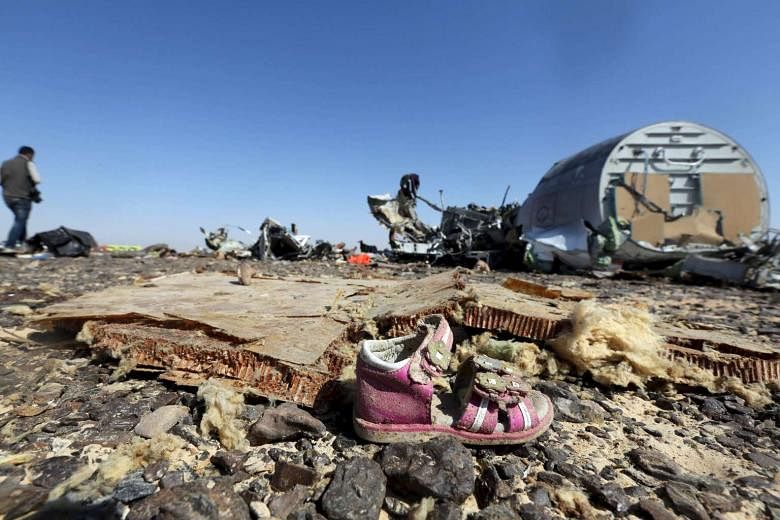LONDON (BLOOMBERG) - Thousands of tourists waited for evacuation from an Egyptian Red Sea resort after Britain suggested a Russian jetliner's downing was carried out by terrorists, renewing concerns about airport security and the threat posed by Islamist extremists.
Companies led by EasyJet and Thomas Cook Group were making plans for about 20,000 people stranded at the Sharm el- Sheikh resort on the Red Sea.
Britain's assessment was based on "all the information available," some of it "sensitive," Foreign Secretary Philip Hammond said on Sky News, a position shared by three US officials speaking on condition of anonymity.
"EasyJet is in close contact with the UK government as to when we may be able to resume flights and repatriate people," spokeswoman Anna Knowles said. "We would only do so when the government deems it safe it travel."
France joined Britain in advising its nationals against all non-essential travel to the resort.
In a telephone call with British Prime Minister David Cameron, however, Russian President Vladimir Putin said it was important that assessments of the cause of the crash be based on information from the official investigation, Interfax news agency reported.
A confirmed bombing would be a "game-changer" in terms of security issues and tourism for Egypt and, to a lesser extent, other countries in the region, according to Michael Horowitz, a senior analyst at the Levantine Group in Israel. "It is something that we haven't seen in many years."
A Russian official familiar with the probe said the evidence so far remains inconclusive. Initial signs point to a terrorist act or technical failure such as a breach of the fuselage.
Readings from the black boxes show the flight progressing normally before some sort of catastrophic event.
Russia sent its top criminal investigator, Alexander Bastrykin, to head its probe, hoping to ensure full cooperation, the official said. He noted Egyptian authorities seem reluctant to blame terrorism, apparently for fear of the impact it would have on their tourism industry.
President Vladimir Putin's spokesman, Dmitry Peskov, on Wednesday said there's "no basis" to conclude terrorism at this stage of the probe, even as Russian officials were ordered to bolster security measures in all countries where the country's airlines fly.
ISIS INVOLVEMENT?
Preliminary evidence suggested involvement by the Islamic State in Iraq and Syria (ISIS) militant group and investigators were examining the prospect that someone - perhaps a baggage handler or airline official - was bribed to get a bomb onto the Metrojet airliner, two of the US officials said.
The jet was downed en route from Egypt's Sharm el-Sheikh airport to St Petersburg, killing all 224 people on board. People purporting to represent ISIS claimed the downing was retaliation for Russia's bombing of the extremist group in Syria.
About 330 EasyJet customers were stranded by the cancellation of two flights Wednesday after Britain's intervention, and a further 1,800 were due to fly out Thursday (Nov 5) on six services.
While an initial statement said flights might resume after UK officials review security arrangements in Sharm el-Sheikh, Hammond would say only that trips might start again before the Christmas rush.
FLIGHTS HALTED
EasyJet scrapped four flights from London on Thursday, one from Manchester and one from Milan, where the Italian government has yet to comment on the cause of the crash.
Thomas Cook said it has 1,700 customers in the Red Sea resort who will be brought back in "due course," with free accommodation to be provided in the interim. The tour operator and rival TUI AG's Thomson arm scrapped all services through Nov 12.
British Prime Minister David Cameron told BBC News on Thursday that he will discuss security at Sharm-el-Sheikh airport with Egyptian President Abdel-Fattah El-Sisi in London on Thursday. He said he would also call Putin to discuss the situation. The Netherlands also said Thursday that it was advising people not to travel to Sinai.
"We don't know for certain it was a terrorist bomb," Cameron said. "The reason we've acted is because of intelligence and information that we've had that it was more likely than not that it was a terrorist bomb" "It's the right thing to do to suspend these flights," Cameron said.
PREMATURE SPECULATION
Egypt's civil aviation ministry, whose investigators are leading the probe, said that theories about the cause of the tragedy are no more than speculation. Investigators have not found any evidence or information proving the plane was downed by an on-board explosion, Civil Aviation Minister Hossam Kamal said in a statement Thursday.
While the A321's flight-data recorder has been successfully retrieved and is ready for examination, the cockpit-voice recorder was damaged and needs further work to extract sounds from the crucial last few minutes of the flight.
The disintegration of the aircraft close to its cruising altitude, with debris spread over an area nevertheless suggests that it suffered a catastrophic break up that experts agree was most likely caused by some form of attack or a structural failure.
El-Sisi has been waging a fierce fight against militants since the 2012 ouster of Islamist President Mohamed Mursi in a military-backed popular uprising. The military has been focusing their fight on Mursi's Muslim Brotherhood movement and allied Islamists, with the brunt of the violence in the restive north of Sinai.
So far, southern Sinai, which is home to the famed Red Sea diving resorts, has been spared much of the violence. If proven that the crash was the result of a bomb, the area's struggling tourism market could suffer a major blow.

